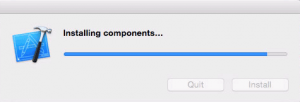

- #UNINSTALL MACPORTS PACKAGE INSTALL#
- #UNINSTALL MACPORTS PACKAGE UPDATE#
- #UNINSTALL MACPORTS PACKAGE SOFTWARE#
MacPorts (neé DarwinPorts) was originally created by engineers working in the Apple UNIX engineering team as part of the OpenDarwin project. Then you can enjoy a very similar configuration and maintenance stack across your server and workstation fleet.
#UNINSTALL MACPORTS PACKAGE INSTALL#
Then use pkgsrc to install all of the additional software. For example on RHEL, instead of adding EPEL and IUS you can just not install anything on top of the base system with yum/dnf and only use yum/dnf for updating the base system. If you work in an environment with some combination of RHEL, SmartOS, and macOS then you should consider strongly standardizing on pkgsrc. On the downside, all of the GUI packages for macOS are built for X rather than Quartz and the repository is smaller than Homebrew and MacPorts. If you want to get rid of pkgsrc, just rm -fr /opt/pkg and go on with life. If somehow you borked up pkgsrc, just rm -fr /opt/pkg and install it again. All of the packages are installed into /opt/pkg which means they are safely isolated from your base system. The packages are mostly pre-built binaries and pkgsrc is fast and works well. Packages for Red Hat Enterprise Linux / CentOS, macOS, and SmartOS are maintained by Joyent. It is the standard package manager for NetBSD and SmartOS. I have heard that GitHub uses Homebrew for this. This can be helpful if you set up a new Mac frequently or have a standard config to push out. You can also use it to automate installing apps from the App Store, commercial software, and UNIX utilities. Homebrew is popular so it is probably the lowest friction option despite my criticism. I also find it’s beer metaphors of casks and cellars overly cute.
#UNINSTALL MACPORTS PACKAGE UPDATE#
Homebrew will also help you to install things that it doesn’t control and cannot update - which I don’t think it should do. If Homebrew messes up or gets broken then it can be a big mess to clean it up without breaking anything that doesn’t belong to Homebrew.

This is a security problem but also it is in conflict with the conceptual purpose of /usr/local/bin being the directory where I install programs myself. My issue is primarily that it works by taking over /usr/local/bin and changing the permission on that directory. Homebrew is currently the most popular of these, but it is “too clever by half”. There are three main package managers for macOS: Alternatively you can download and install things by hand, possibly configuring and compiling them by hand. You need a package manager when you want to install UNIX tools that Apple doesn’t bundle or newer or different versions of tools that they do.Ī package manager helps you to download, possibly compile, install, and update tools in the UNIX environment in macOS. The base system of command line applications available in a default install are also good enough for poking around and getting started with learning the UNIX system.
#UNINSTALL MACPORTS PACKAGE SOFTWARE#
macOS is fully functional out of the box with the software shipped by Apple. JLeave a comment Package managers for macOSĭo I need a package manager? If you never open Terminal.app the answer is definitely, no.


 0 kommentar(er)
0 kommentar(er)
